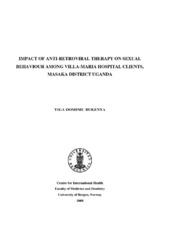Impact of anti-retroviral therapy on sexual behaviour among Villa-Maria hospital clients, Maska district Uganda
Master thesis
Permanent lenke
https://hdl.handle.net/1956/2994Utgivelsesdato
2008Metadata
Vis full innførselSamlinger
Sammendrag
Behavioural change programmes specifically those promoting faithfulness, partner reduction and consistent right condom use contributed to the early declines in HIV incidence and prevalence in Uganda. To guard against treatment optimism and continued risky sexual practices which might result from improved health status, ART clients are also subjected to intensive behavioural change intervention campaigns in Uganda. However, comprehensive evaluation of behavioural change interventions /programmes and the impact of ART on sexual behaviour in Uganda is scarce and limited to only six months duration on ART. This thesis investigated ART clients' knowledge about HIV/AIDS and ART, patterns of VCT services use prior to ART initiation, sexual practices before and after ART initiation. The extent to which ART clients adapt to HIV/AIDS preventive measures and the appropriateness of the health education model were also investigated.A cross sectional study was conducted between June-September 2008 among Villa-Maria hospital clients in Masaka district Uganda. A purposive convenient sampling technique was applied to select a total of 48 participants. Data was collected using interviewer administered questionnaire, in-depth interviews and focus group discussions. A total of 48 questionnaires were administered, 16 in-depth interviews and 4 focus group discussions with 32 participants were conducted.Study participants were evenly distributed across the sexes. The majority were subsistence farmers and had been on ART for almost two years on average. Their educational level was predominantly upper primary. The mean distance covered to the ART /VCT centre was 18km. The findings indicate high levels of knowledge about both HIV/AIDS and ART except for a few individual cases. The study shows that ART initiation had improved the health of the clients and had enabled them to start getting involved in economic activities although at a lower rate than prior to their HIV/AIDS diagnosis. Although no participant reported being a victim to stigmatisation, routine home visits were criticised for working as a trigger for stigmatisation and HIV infection suspicion. Participants reported increased food appetite as a consequence of ART treatment, and occurrence of ART side effects was reported to be due to none observance of ART rules. Reduced frequency of sexual intercourse and reduced number of sexual partners were also reported after diagnosis and ART initiation. Condom use was reported to be inconsistent because it was disliked by the male clients, the desire to have children, financial dependency and being in a stable marital union. VCT uptake followed long episodes of persistent illnesses and it was influenced by relatives, friends, health care workers, HIV/AIDS diagnosis was confirmed at the first VCT visit for all clients. The study showed that there is an emerging phenomenon of ART self discontinuation among the newly born again Christians.Although ART treatment benefits stretched beyond its clinical benefits, complete recovery of ART clients' economic status prior to their HIV/AIDS diagnosis was still a big challenge to interviewees. Sexually active ART clients don't use condoms consistently and correctly despite their reported reduction in frequency of sexual intercourse, number of sexual partners and high knowledge levels about HIV/AIDS and ART. VCT uptake campaigns should be made mode vibrant while...
Utgiver
The University of BergenOpphavsrett
Copyright the author. All rights reservedThe author
